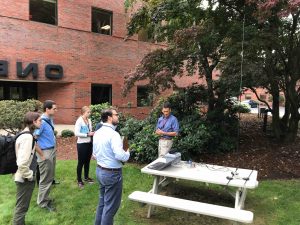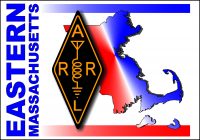
Radio amateurs at MIT Lincoln Laboratory in Lexington conducted an Amateur Radio course this past fall, according to MIT Lincoln Lab employee Brian Smigielski, AB1ZO.
“It was offered through the Technical Education Committee here at the Lab, which fosters employees taking courses to encourage classroom learning beyond their typical daily tasks. I ran the course jointly with Jon Schoenberg, AA1FH, and it was really the first of its kind here at the Lab.”
Other amateur volunteer instructors included: Ameya Agaskar, KB1SPV; Dave Brigada, AB1QV; Chip Coldwell, W1CMC; Chris Galbraith, W1XG; Tommy Hotaling, K1MFD (silent key); Phil Erickson, W1PJE; John Kaufmann, W1FV; Dave Cipolle, W1SZ; Ed Parish, K1EP; Matt Lape, N1XB; Daniel Joy, N1QHC; Mark Besch, NS1V; Steve Russell, WA1HUD; Burns Fisher, WB1FJ.
Brian and Jon initially started with 60 students, but after attrition they ended up having 45 students consistently coming each week. “This actually turned out to be pretty huge on our part since most courses drop down to about 10 or so after 2-4 weeks.” The two were told by the Committee “it was the most attended and popular course ever offered at the Lab.”
Rather than teaching to the exam, AB1ZO and AA1FH divided the content into two halves: the first half discussed theory, while the second half delved into the applications. “Although we encouraged people to get their license, we knew it would be a turn-off if we continually mentioned this or taught a course which really was about taking the exam.” Instead, Brian and Jon taught a “survey course” to whet peoples’ appetites for Amateur Radio and get them excited.
Students were allowed to get on their air both during and after class with quick-setup outdoor stations, as well as visit Matt Strelow’s (KC1XX) superstation. “We encouraged the participants to buy inexpensive SDR dongles and observe the RF spectrum. So much fun can already be had by just receiving. We also had some hams from the class team up with NEST (New England Sci-Tech) to operate Field Day. It was a truly rewarding experience. We all worked really well together and will continue to partner with NEST in the future.”
“Since a bunch of RF geeks already work here, this was not difficult to pull this off. The really neat thing is, we had people in all sorts of job functions take our class. There were those staff members who regularly built RF hardware, software folks, group leaders, IT specialists, operators, machinists, and sys admins.”
The hams intend to offer the course every two years. The next one is anticipated to occur in the fall 2020 timeframe.

